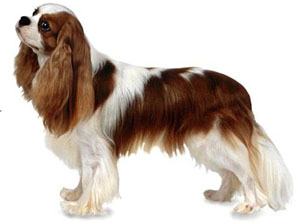
Although he’s born to be a companion, the Cavalier King Charles Spaniel dog breed retains the sporty nature of his spaniel ancestors. If he’s not sitting on a lap or getting a belly rub, nothing makes him happier than to flush a bird and then attempt to retrieve it. One of the largest of the toy breeds, he’s often as athletic as a true sporting breed and enjoys hiking, running on the beach, and dog sports such as agility, flyball and rally. Some have even shown their prowess as hunting dogs. The more restful members of the breed find success as family friends and therapy dogs.
See below for complete list of Cavalier King Charles Spaniel characteristics!

Adaptability: ★★★★★
Adapts Well to Apartment Living
Contrary to popular belief, small size doesn't necessarily an apartment dog make — plenty of small dogs are too high-energy and yappy for life in a high-rise. Being quiet, low energy, fairly calm indoors, and polite with the other residents, are all good qualities in an apartment dog.
Good For Novice Owners: ★★★★★
Some dogs are simply easier than others: they take to training better and are fairly easygoing. They're also resilient enough to bounce back from your mistakes or inconsistencies. Dogs who are highly sensitive, independent thinking, or assertive may be harder for a first-time owner to manage. You'll get your best match if you take your dog-owning experience into account as you choose your new pooch.
All Around Friendliness: ★★★★
Dog Friendly
Friendliness toward dogs and friendliness toward humans are two completely different things. Some dogs may attack or try to dominate other dogs even if they're love-bugs with people; others would rather play than fight; and some will turn tail and run.
Affectionate with family: ★★★★★
Some breeds are independent and aloof, even if they've been raised by the same person since puppyhood; others bond closely to one person and are indifferent to everyone else; and some shower the whole family with affection. Breed isn't the only factor that goes into affection levels; dogs who were raised inside a home with people around feel more comfortable with humans and bond more easily.
Trainability: ★★★
Easy to Train
Easy to train dogs are more adept at forming an association between a prompt (such as the word "sit"), an action (sitting), and a consequence (getting a treat) very quickly. Other dogs need more time, patience, and repetition during training.in which case you'll need to use rewards and games to teach them.
Excersize needs: ★★★
Potential for playfulness
Some dogs are perpetual puppies -- always begging for a game -- while others are more serious and sedate. Although a playful pup sounds endearing, consider how many games of fetch or tag you want to play each day, and whether you have kids or other dogs who can stand in as playmates for the dog.